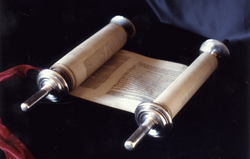
Officially, there are four books which the LDS Church has declared "canon". Together, these books of scripture constitute the "Standard Works". Here they are in no particular order.
|
|
 The Church of Jesus Christ of Latter-day Saints has an "open canon" of scripture. This means that the LDS Church teaches that God's revelation of divine principles to mankind did not end with the conclusion of the Holy Bible. It is a fundamental belief in Mormonism that God has not shut the door on mankind, that the fullness of the Gospel of Jesus Christ has been restored to the earth, and that God speaks to us today through the mouths of His prophets and through personal revelation in answer to prayer.
Officially, there are four books which the LDS Church has declared "canon". Together, these books of scripture constitute the "Standard Works". Here they are in no particular order.
0 Comments
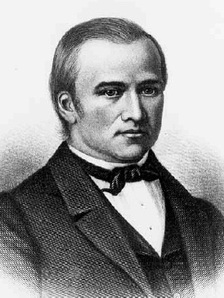 Newel K. Whitney (left) is an extremely important figure in the history of Mormonism. While somewhat obscure, many members of the Church of Jesus Christ of Latter-day Saints are familiar with story of his first encounter with Joseph Smith, in which the Prophet famously said, "Newel K. Whitney, thou art the man." But a story like this one needs a little background.
Born in 1795, a full ten years before Joseph Smith Jr., the first Prophet of the Church, Newel Whitney grew up in Vermont, but as an adult would move to Kirtland, Ohio and open a general store having some success in business. In the late 1820's, Newel and his wife, Elizabeth Ann Whitney were on a spiritual journey of sorts. They were looking for a church to join, and for a while were active in the Campbellite movement, though eventually returned to their search. In late 1830, just months after the Church of Jesus Christ of Latter-day Saints had officially been founded, the Whitneys were visited by the missionaries, who brought with them a copy of the Book of Mormon. Elizabeth Whitney heard the missionaries' message first, and was deeply moved, getting baptized into the Church November of that year. Newel still wasn't convinced though, and continued to pray for an answer. In February of 1831, Joseph Smith himself journeyed to Kirtland, Ohio and showed up unannounced to Newel K. Whitney's store. Joseph marched right up to Newel and proclaimed, "Newel K. Whitney, thou art the man!" Whitney had never seen Smith in his life, and didn't know what the Prophet was talking about, or how he knew his name. Smith explained, "I am Joseph the Prophet. You prayed me here; now what do you want of me?" This was exactly the witness that Whitney needed. Soon Newel K. Whitney would join the Church, and in time became one of the greatest leaders in the history of Mormonism. When he died in 1850, he was the Presiding Bishop of the Church. He left a great legacy, and one that continues to today. His family and descendants shared his trait of hard work and faith, and continue to bless the world through their service. 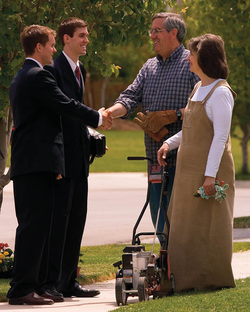 Unless you live in a nation that outlaws proselytism, you probably have at one point in your life, had some sort of contact with one of the Mormon missionaries. Maybe you've seen them handing out copies of the Book of Mormon on the street. Perhaps you've seen them on their bikes, on the way to some appointment. Maybe they've even knocked on your door.
Though they may know of them, people might not always know a whole lot about these these missionaries who spread Mormonism throughout the world. 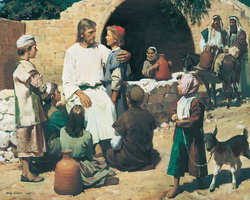 Jesus Christ takes on many roles. He is our teacher, our master, our elder brother, and our redeemer, just to name a few. One exceptionally large role he fills is as the Son of God. But what does it mean to be the Son of God? Aren't we all God's children?
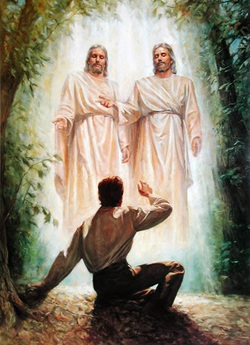 The name Joseph Smith inspires an entire possible spectrum of emotions from those who have heard it before. While many revere and love the things he accomplished, there are others who view him as either a deceived fool or an ingenious deceiver of others. It is safe to say that he is one of the most controversial figures of the nineteenth century. But all of this considered, I'd say Joseph Smith and his legacy have had a profound impact on my life. As a boy I was taught the stories of his life: his encounter with God and Jesus Christ at age fourteen, the visitation of an angel named Moroni, who led him to a set of golden plates inscribed with the record of ancient Jews in America. As a kid, I never doubted this. Why should I? It was what I was taught from an early age, alongside the stories of the Bible. These cherished beliefs were taken for granted. It was just part of me, as much the part of me that knew the sky was blue. But as anyone who has ever grown up knows, age brings with it some degree of cynicism. The sunny world of our childhood, if we let it, can become the oppressive regime of our teen years. Of course, I never felt "oppressed" by my religion. But, as everyone does, I began to analyze the world around me with more scrutiny. In my formative late teens, I was confronted with all manners of challenges to my faith, which ironically seem to shape my faith today. As I became a man, I felt the need to discover myself, to (much like Joseph Smith had) really figure out what I believed. This involved much study, much prayer, and faith that my Lord would answer these prayers. I think the problem most people run into with this is that they expect their answer to be all at once, a sweeping glorious experience of faith-affirming revelation. This can happen, but is frequently untrue. My testimony-building experience has been, and still is, gradual. Isaiah's timeless words ring true in my life: "But the word of the Lord was unto them precept upon precept, precept upon precept; line upon line, line upon line; here a little, and there a little..." (Isaiah 28:13) The abundance of material out there that purports to "disprove" Joseph Smith and his claims does not bother me, because my study and prayer has led my to a different conclusion: that Joseph Smith did not, and could not churn out a pseudo-religious novel as complex as the Book of Mormon. My study and prayer has confirmed in my mind that, though imperfect, this man was a prophet ordained of God, who truly saw what he said he saw, and instructed by God to restore the fullness of the gospel of Jesus Christ to the earth once more. Joseph Smith, his legacy of faith, and his love for Jesus Christ have compelled me, changed me even. I am ever grateful that in 1820, he knelt in a grove of trees, and asked his Father for clarity, and eternally grateful that his prayer was answered when he witnessed God the Father and Jesus Christ. I love this gospel with all my heart, and am grateful for it every day.I'll close in the name of Jesus Christ-- Amen. |